De Franse schrijver Jean Paul Sartre werd geboren op 21 juni 1905 in Parijs. Zie ook alle tags voor Jean-Paul Sartre op dit blog.
Uit: Nausea (Vertaald door Robert Baldick)
“I jump up: it would be much better if I could only stop thinking. Thoughts are the dullest things. Duller than flesh. They stretch out and there’s no end to them and they leave a funny taste in the mouth. Then there are words, inside the thoughts, unfinished words, a sketchy sentence which constantly returns: “I have to fi. . . I ex. . . Dead . . . M. de Roll is dead . . . I am not … I ex. . .” It goes, it goes . . . and there’s no end to it. It’s worse than the rest because I feel responsible and have complicity in it. For example, this sort of painful rumination: I exist, I am the one who keeps it up. I. The body lives by itself once it has begun. But though I am the one who continues it, unrolls it. I exist. How serpentine is this feeling of existing, I unwind it, slowly. … If I could keep myself from thinking! I try, and succeed: my head seems to fill with smoke . . . and then it starts again: “Smoke . . . not to think . . . don’t want to think … I think I don’t want to think. I mustn’t think that I don’t want to think. Because that’s still a thought.” Will there never be an end to it?
My thought is me: that’s why I can’t stop. I exist because I think . . . and I can’t stop myself from thinking. At this very moment, it’s frightful, if I exist, it is because I am horrified at existing. I am the one who pulls myself from the nothingness to which I aspire: the hatred, the disgust of existing, there are as many ways to make myself exist, to thrust myself into existence. Thoughts are born at the back of me, like sudden giddiness, I feel them being born behind my head … if I yield, they’re going to come round in front of me, between my eyes, and I always yield, the thought grows and grows and there it is, immense, filling me completely and renewing my existence.”
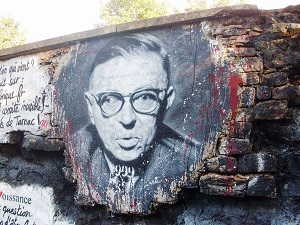
Portret op een muur in Saint-Romain-au-Mont-d’Or
De Braziliaanse schrijver Joaquim Maria Machado de Assis werd geboren in Rio de Janeiro op 21 juni 1839. Zie ook alle tags voor Machado de Assis op dit blog.
Uit: The Posthumous Memoirs of Brás Cubas (Vertaald door Gregory Rabassa)
“Late and bored. Some nine or ten people had seen me leave, among them three ladies: my sister Sabina, married to Cotrim–their daughter, a lily of the valley,–and … Be patient! In just a little while I’ll tell you who the third lady was. Be content with knowing that the unnamed one, even though not a relative, suffered more than the relatives did. It’s true. She suffered more. I’m not saying that she wailed, I’m not saying that she rolled on the ground in convulsions, or that my passing was a highly dramatic thing … An old bachelor who expires at the age of sixty-four doesn’t seem to gather up all the elements of a tragedy in himself. And even if that were the case, what least suited that unnamed lady was to show such feelings. Standing by the head of the bed, her eyes cloudy, her mouth half open, the sad lady had a hard time believing my extinction.
“Dead! Dead!” she kept saying to herself.
And her imagination, like the storks that an illustrious traveler watched taking flight from the Ilissus on their way to African shores without the hindrance of ruins and times–that lady’s imagination also flew over the present rubble to the shores of a youthful Africa … Let it go. We’ll get there later on. We’ll go there when I get my early years back. Now I want to die peacefully, methodically, listening to the ladies sobbing, the men talking softly, the rain drumming on the caladium leaves of my suburban home, and the strident sound of a knife a grinder is sharpening outside by a harness-maker’s door. I swear to you that the orchestra of death was not at all as sad as it might have seemed. From a certain point on it even got to be delightful. Life was thrashing about in my chest with the surging of an ocean wave. My consciousness was evaporating. I was descending into physical and moral immobility and my body was turning into a plant, a stone, mud, nothing at all.
I died of pneumonia, yet if I tell my reader that it wasn’t so much the pneumonia that caused my death but a magnificent and useful idea he might not believe me and, nevertheless, it’s the truth. Let me explain briefly. You can judge for yourself.”
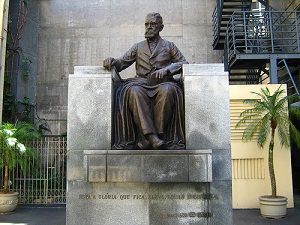
Standbeeld in Rio de Janeiro
De Duitse schrijer en uitgever Georg Lentz werd geboren in Blankenhagen op 21 juni 1928. Zie ook alle tags voor Georg Lentz op dit blog.
Uit: Muckefuck
„(Die Sorte hat sich leider als anfällig gegen Mehltau erwiesen.) Wir alle haben in den Wintergärten ausrangierte Badewannen oder Tonnen aufgestellt, in die wir das Regenwasser vom Dach leiten, zur Bewässerung der Pflanzen. Im Mai ernten wir die ersten Radieschen, rot und frisch. Sie knacken, wenn man hineinbeißt, und brennen die Zunge. Und im Sommer sitzen alle draußen, die Frauen kühlen Bierflaschen in Emailleeimern und bringen selbst gebackenen Bienenstich.
Heute benutzen die meisten Kühlschränke. Ich nicht. Denn als Ede, mein Vater, von Beruf erst Taxifahrer, dann Taxenbesitzer, die Laube baute, sorgte er für einen großen, kühlen Keller. Im Fußboden der Veranda ist eine Falltür eingelassen, und eine hölzerne, etwas wackelige Stiege führt hinunter.
Mit diesem Keller hängt eine meiner frühesten Erinnerungen zusammen. Fünf Jahre alt mag ich gewesen sein, als ich meine erste Expedition in den kramgefüllten Keller unternahm, auf der Suche nach zwei schwarzen, gelb gebordelten Kavalleriestiefeln, deren genaues Aussehen mir längst bekannt war. Durch ein Bild. In meinem Zimmer nämlich hing ein ziemlich großer Vierfarbdruck, Reminiszenz an die aktive Dienstzeit meines Vaters als Kavallerist. Es zeigte Ede in dunkelblauer Paradeuniform, zu der eben die gelb gebordelten Stiefel, hier augenscheinlich auf Hochglanz poliert, gehörten. Im Hintergrund unterstrich ein tänzelnder Apfelschimmel die hippologische Beziehung. Nur Edes Gesicht war schwarz-weiß. Ein aufgeklebtes Foto. An den Rändern löste es sich.”
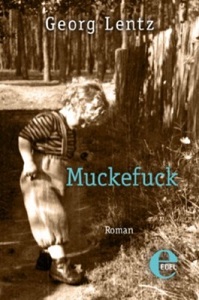
Cover
De Surinaamse dichteres en schrijfster Chitra Gajadin werd geboren in District Suriname op 21 juni 1954. Zie ook alle tags voor Chitra Gajadin op dit blog.
Jodenbreestraat
Boslandcreoolse op de stoep
uitgestald op wankel krat handvol
waren blijft mijn broer staan wijst
een vapetablet aan vijftig cent per
stuk in vluchtig opkijken staren haar
ogen door ons heen weerkaatst haar
blik verre oerwouden het lange
weerzien
heb je twee gulden
wat doe je met vier tabletjes?
twee nachten met één
gelaten stem in de strijd zonder
wapens in een land vol bloedzuigers
Domburg 1986
De rivier is diepbruin in rimpelloos
zwijgen
droge ogen vol mijmering langs de
kant
treurende oude bomen de
schemering
holt op blote kindervoeten vooruit
Avondstilte ruw gesmoord in
alcohol
wk-kijkers in warungs
bromfietsen stuiven uiteen
als geschrokken honden in de nacht
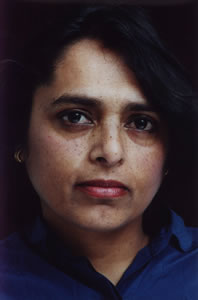
De Duitse dichter, schrijver en essayist Helmut Heißenbüttel werd geboren op 21 juni 1921 in Rüstringen, tegenwoordig Wilhelmshaven. Zie ook alle tags voorHelmut Heißenbüttel op dit blog.
Gedicht über die Übung zu sterben (Fragment)
americans in trains Bleiglanz auf der Limmat gleichmäßige
Verteilung von Licht Figur Geräusch Wasserglock Leuteschaum
Schneewind Steingesicht Efeurhomb Glanzknot Mövenflugornament
oberhalb strandend an einem Ufer aus abendlich aufeinander
getürmt Gespräch das nicht Sicherung und Mussorgsky gespielt von
Sviatoslav Richter Partner die fröhlich einander verständlich
ohne je selbst ins Auge das die Tendenz zu weit Ortsfremde
sowieso triumphierend über den Torso des weiblichen Rückens
blasses Licht aber angenehm und IN WELCHEN VERHÄLTNISSEN
SONST MEIN TREIBEN ZU VIELEM WAS SONST HIER GILT UND
IST UND NICHT GILT UND GILT UND NICHTS IST UND WIE
SICH DIESER ZUSTAND SONST IN SICH SELBER BEFINDE
DARÜBER WÄRE WOHL VIEL DENN UNSER WESEN HAT HIER
DEN VORTEIL IN SEINER WELTLÄUFIGKEIT DAVON BERÜHRT
ZU WERDEN MEIST NUR WENN MAN LUST HAT ES VON SICH
SO ZIEMLICH Schräghandgeruch Wurzelhand hin und her
wagrecht Lupinengelb zwischen Gitterhand Strichketten Gestäng
schattenschuppig Küste indrin und eine Schwierigkeit
kommt von hinten und geht nie mehr weg Grenzriß weißrasch
wütend bewischt vorüber die Silhouette die weggedreht plötzlich
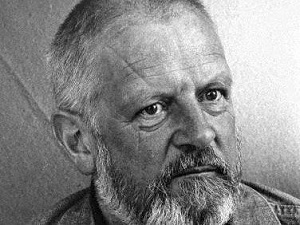
De Franse schrijfster Françoise Sagan (pseudoniem van Françoise Quoirez) werd geboren in Cajarc, Lot op 21 juni 1935. Zie ook alle tags voor Françoise Sagan op dit blog.
Uit: Een korte pijn (Vertaald door Marijke Arijs)
‘U bent, geloof ik, net zo dol op de hedendaagse architectuur als ik,’ lachte Matthieu.
Ten teken van respect stak hij Saltiéry een sigaar toe. Een zo veelzeggend teken van respect, dat zijn medewerkers bij het binnenkomen dadelijk roken of ze Matthieus nieuwe klant met egards moesten behandelen.
‘Ik heb erover nagedacht,’ zei Matthieu met tegenzin. ‘Het ergste zou wel vermeden kunnen worden. Veel hangt af van het gebruikte materiaal, de vorm, het aantal huisjes dat u wil bouwen…’
Plots was hij ontspannen, geïnteresseerd, nieuwsgierig. Plots kreeg hij zin om dat terrein om te vormen tot een lieflijke, romantische plek, net zo adembenemend mooi als hij ze vijftien jaar geleden als verliefde jongeman had gevonden. Of tien jaar geleden. Wat maakte het uit? Die Saltiéry leek een geschikte kerel. Had hij maar zo iemand als vriend gehad, en niet die Robert Gaudet.
‘Ik heb al een paar schetsen gemaakt. Ik zal ze u laten zien.’
Hij trok zijn la open, haalde er de mappen uit en gooide ze op een hoop op zijn bureau – tegen alle ongeschreven regels in die bepalen dat een architect de vruchten van zijn verbeelding alleen schets na schets, angstvallig en geleidelijk mag onthullen wanneer alle contracten zo goed als getekend zijn, precies zoals ze een vrouw het gruwelijk verminkte lijk van haar echtgenoot laten zien ter identificatie. Daar lagen alle plannen, alle ideën ingegeven door Matthieus geest en schoonheidsgevoel, op een hoop. Werk dat die man zich, als hij oneerlijk was, in het geheugen kon prenten om het later te gebruiken.”
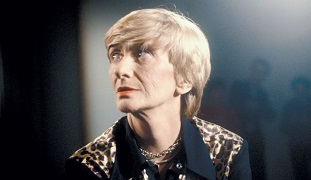
Zie voor nog meer schrijvers van de 21e juni ook mijn vorige blog van vandaag.

1 thoughts on “Jean-Paul Sartre, Machado de Assis, Georg Lentz, Chitra Gajadin, Helmut Heißenbüttel, Françoise Sagan”
De commentaren zijn gesloten